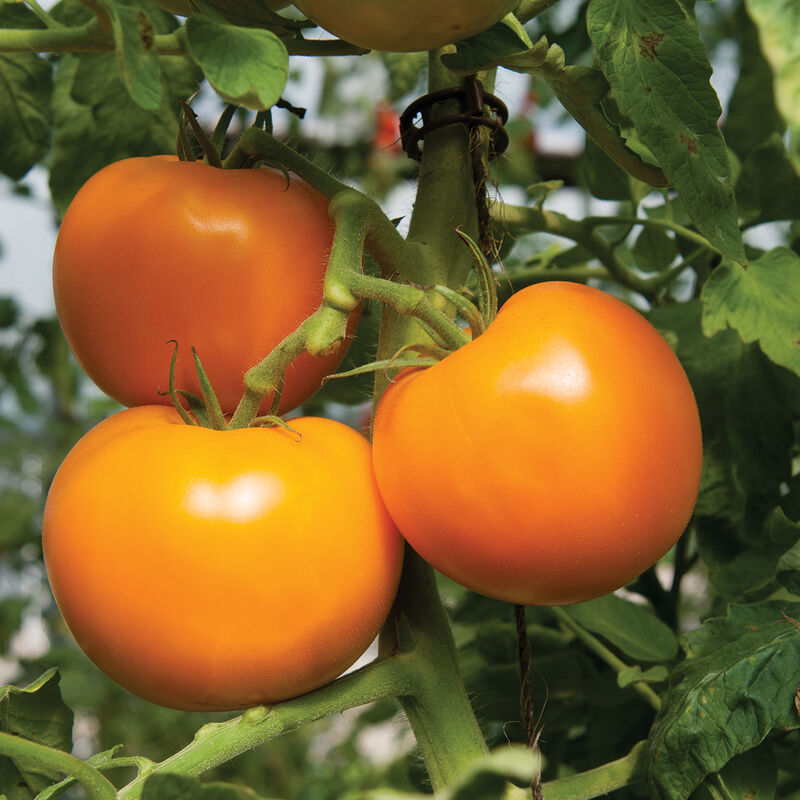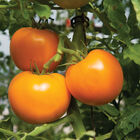Beorange (F1) Tomato Seed
Beorange (F1) Tomato Seed
Orange slicer for the greenhouse.
Great flavor with a better balance of acid and sweetness than most orange tomatoes. Beorange is bred with the vigor and disease resistance to stand up to a long season in the greenhouse. 6–8 oz. fruits are firm but not hard, nor prone to cracking or other blemishes. Eye-catching, deep orange color. Indeterminate.Disease Resistance:
Fusarium Crown and Root Rot (High)Fusarium Wilt races 1, 2 (High)
Specs:
- This product does not ship to Canada.
- This product does not ship to the following countries: United Arab Emirates, Austria, Australia, Barbados, Belgium, Bulgaria, Bermuda, Bahamas, Switzerland, Cyprus, Czech Republic, Germany, Denmark, Estonia, Spain, Finland, France, United Kingdom, Greece, Hong Kong, Croatia, Hungary, Ireland, Iceland, Italy, Japan, Republic of Korea, Kuwait, Cayman Islands, Lithuania, Luxembourg, Latvia, Malta, Netherlands, Norway, New Zealand, Oman, Poland, Portugal, Qatar, Romania, Saudi Arabia, Sweden, Singapore, Slovenia, Slovakia, San Marino, Thailand, Trinidad and Tobago, Taiwan, Ukraine.
SCIENTIFIC NAME:
Solanum lycopersicumCULTURE:
Tomatoes thrive in a tunnel or greenhouse environment, which increases your control over fruit quality and extends the harvest season, both early and late. Growing info is similar to field tomatoes, but transplants are typically started earlier and may need additional development time (6–7 weeks) and supplemental lighting to maintain strong seedlings.DAYS TO MATURITY:
From transplanting.TRANSPLANTING INDOORS:
Provide 4–6 sq.ft. growing area per leader depending on variety, climate, disease pressure, and pruning methods. Plant deeply like field tomatoes unless grafted, in which case, plant with union above soil. For 5–7 days after transplanting, maintain 73–77°F (23–25°C) day and night temperature to promote rapid foliar and root growth. At fruit set, lower night temps to 62–66°F (17–19°C) and begin monitoring plants to manage them towards season-long productivity.TRELLISING/PRUNING:
Train plants to 1–2 branchless leaders onto separate vertical strings with trellis clips roughly 1" below every third leaf. Keep taut and reuse bottom clips, keeping at least 3–4 per string. Consider a lower-and-lean system if you have a long season, capable structure, and enough labor. Pruning leaves and clusters can help to manage diseases and steer towards maximum production. Keep grafted plants free from scion roots and rootstock suckers.INSECT PESTS AND DISEASE:
A slightly different set of pests attack indoor crops than outdoor crops, but similar management strategies apply. The use of beneficial insects and grafting is generally more successful in tunnels/greenhouses than open field.HARVEST/STORAGE:
Same as field, plus potential for truss harvesting.TRANSPLANTS:
Avg. 950 plants/1,000 seeds.SEEDS/OZ. (AVG.):
11,000–13,000.PACKET:
15 seeds, plants about 20 feet.Johnny's is committed to your success, every step of the way.
We want you, our customer, to be 100% satisfied with all of our seeds, tools, and supplies.
If anything you purchase from us proves unsatisfactory, we will either replace the item or refund the purchase price.






